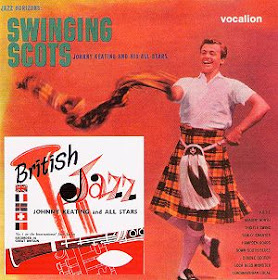Though he is probably better remembered today for his television and movie work, Edinburgh-born Johnny Keating was an accomplished trombonist who left us a meritorious legacy as an arranger and composer as well. Staunch Everton soccer fans know him as the writer of the main theme for the British TV show Z Cars, which is still played before every game at Goodison Park. Though Keating began his career as a big band trombonist and cut some worthwhile jazz records, particularly in the 1950s, he also worked as a pop producer (Adam Faith, Petula Clark, Tony Bennett, Caterina Valente, and Sammy Davis, Jr. were just some of the stars with whom he worked in the '60s) and made a series of expertly produced and recorded albums under the title of Johnny Keating's Space Experience. He even had time to publish a mammoth four-volume book on the profession of songwriting that took him about twenty years to complete. Though he is far from being a household name in the United States, where basically only a few film buffs know who he was, British music lost one of its foremost innovators when Keating passed away on May 28.
 |
| Keating started out as a big band trombonist |
From the point of view of jazz, the two most interesting albums that Johnny Keating made in his career are English Jazz and Swinging Scots, both conveniently reissued on one CD by Vocalion in 2008. English Jazz was released in 1956 by the Bally label, which was apparently part of the company of the same name that made pinball and slot machines. Heavily influenced by West Coast cool jazz, this is a very enjoyable record that finds Keating leading a studio band made out of some of the finest British jazz musicians of the period, such as saxophonists Tommy Whittle and Danny Moss, trombonist George Chisholm, trumpeter Eddie Blair, pianist Bill Le Sage, and drummer Ronnie Verrell, with Dizzy Reece playing bongos on some of the tracks. Most of the tunes are taken at a medium or fast tempo, and among the highlights are "Strictly for KYX," "Gibraltar Rocks," "Good Life," "Eddie Blair's Picnic," and "Piccadilly Jumps." The title of Swinging Scots, released by the Dot label in 1958, is somewhat misleading: despite titles such as "Hampden Roars," "Loch Ness," "Tam O'Shanter," and "Clachnacudan Canal," these are not jazzed-up versions of Scottish songs. The "swinging Scots" here is Keating himself, who once again leads an all-star band full of highly accomplished musicians like Whittle, Blair, and Chisholm, along with trumpeters Jimmy Deuchar and Tommy McQuater, saxophonist Ronnie Ross, and guitarist Alan Metcalfe. The West Coast influence is still evident, but this time we find a fuller big band sound with echoes of cool school arrangers such as Marty Paich and Pete Rugolo. The two albums are lively and swinging and represent the pinnacle of Keating's career as a jazz arranger, constituting the perfect starting point for anyone interested in getting acquainted with the work of this most swinging of Scots.
More information on Johnny Keating
For further information on Keating, please visit his Official Website here, where you will find ample information about his life and career, as well as a collection of interesting pictures.
 |
| Keating (center) during a recording session with Tony Bennett (right) |



No comments:
Post a Comment